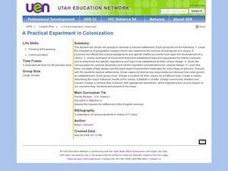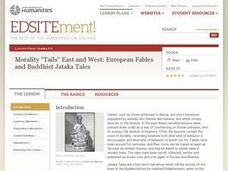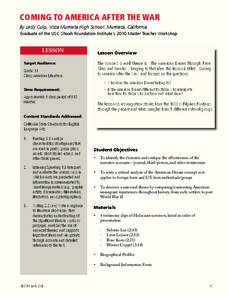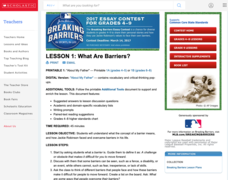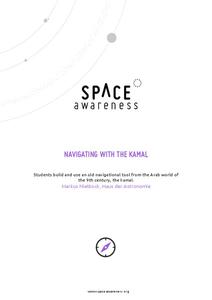Channel Islands Film
Santa Cruz Island - Visible Thinking Routines
Visible Thinking Routines are designed to help learners deepen their understanding of what they are learning and enable them to communicate their understanding of concepts to others. Individuals adopt one of these routines to use to...
Institute of Electrical and Electronics Engineers
Can You Canoe?
A neat handout immerses learners in the history of canoe making. After reading, small groups of mini engineers work to craft a canoe that will not be immersed! This is an ideal exercise in engineering design for your STEM curriculum or...
Columbus City Schools
History Helps When It Comes To Plate Tectonics
Get ready to move, shake, slip, and slide with a well-rounded plate tectonics unit! The engaging resource includes everything you need to inspire eighth grade science scholars, from worksheets to demonstrations. Assess their...
BBC
The Monarch's Changing Role
Though the grandeur and elegance of the British palace remains unchanged throughout history, the role of the monarch has shifted from absolute rule to collaboration with a constitutional parliament. Young historians learn about the...
Curated OER
A Practical Experiment In Colonization
Role-play and simulation exercises are fantastic ways to help learners understand the reality behind many social and historical events. Pretending they are colonists, upper graders choose a location, create a history, establish laws, and...
Curated OER
Morality "Tails" East and West: European Fables and Buddhist Jataka Tales
Have your class explore Buddhist Jataka Tales to compare and contrast them to European fables. After defining fables, Jataka tales, and the elements of each, learners identify themes and patterns for both types of narratives and the...
University of Southern California
Coming to America After the War
As part of their exploration of the American dream, class members examine primary source materials to compare immigrant experiences of those arriving early in our country's history to those arriving in the US after World War II. To...
Smithsonian Institution
The Soldier’s Experience—Vietnam versus World War I
The Vietnam War and World War I were two very important—and different—wars. To understand the differences, and similarities, class members watch videos, examine primary source documents, and then create a newscast that examines the...
National Museum of the American Indian
The Kwakwaka'Wakw: A Study of a North Pacific Coast People and the Potlatch
Discover the cultural practices and unique value systems of a group of native peoples from Canada called the Kwakwaka'wakw. Your young historians will discuss how conceptions of wealth can vary and how these native people utilized...
Curated OER
English Perspectives
To further their understanding of the basis of the conflicts between the Pocumtucks and the English settlers, class members research the religious beliefs and attitudes of the Puritan farmers that settled in Deerfield, Ma.
Scholastic
Lesson 1: What Are Barriers?
Scholars discuss the concept of a barrier with a short passage on Jackie Robinson. The writing process begins with a paragraph and several other sentences about Robinson's unique traits that made breaking a barrier possible.
Curated OER
Pocumtucks in Deerfield
As part of a study of colonial and Native American history, class members focus on the beliefs and land use of the Pocumtucks, who settled near Deerfield, Massachusetts. Students examine their beliefs about land use and ownership, the...
Crafting Freedom
F.E.W. Harper: Uplifted from the Shadows
Young historians discover the life of an incredible African American woman who, as an anti-slavery lecturer prior to the Civil War, defied stereotypes of what women could accomplish. Pupils explore the concept of stereotyping, read...
Maryland Department of Education
The Concept of Diversity in World Literature Lesson 5: The Tragic Hero
Should identifying a tragic hero be based on a universal definition or a definition based on the morals and values of a specific culture? As part of a study of Things Fall Apart, class members read Sylvia Plath's "Colossus" and then...
Core Knowledge Foundation
Isn’t It Exciting? (The American Industrial Revolution and Urbanization)
America was built on the ingenuity, work ethic, and foresight of our ancestors. Sixth graders learn about the complex Gilded Age in American history, including the prominent inventors and captains of industry, and how they all connect...
Pulitzer Center
Peacebuilding: Taking Home Lessons Learned in Africa
Learners take a closer look at one journalist's work on UN Peacebuilding efforts in four African nations: Sierra Leone, Burundi, Central African Republic, and Guinea Bissau. They collaborate to define peacebuilding and discuss the...
Equality and Human Rights Commission
Equality
Despite passing the Equality Act in 2010 covering many groups, gender inequality in Great Britain remains. Scholars investigate the concept of equality with a presentation, discussion, and hands-on timeline activities. The seventh lesson...
Curated OER
Human Cloning: Is it Biological Plagiarism?
Is cloning good or harmful? Help your class understand the risks and benefits as they read, research, and discuss human cloning. Individuals form teams, research information, and present to the class before concluding with an in-depth...
Howard Hughes Medical Institute
Natural Selection and the Evolution of Darwin's Finches
Darwin explained the connection between species of finches 150 years before scientists understood DNA. Technology and progressing science proved he was right, yet many struggle to understand how natural selection happens. Scholars use...
Smithsonian Institution
Comparing Confederate and Union Soldiers
The Civil War, a war that divided a nation. Comparing and contrasting the Confederate and Union soldiers is not always an easy task, but the eighth of 15 resources makes it easy to teach the concepts. Exercises include watching videos in...
K20 LEARN
Whose Manifest Destiny? Westward Expansion
Your land is my land! Young historians investigate the concept of Manifest Destiny used by the United States government to justify western expansion. Jigsaw groups read primary source documents to gain an understanding of the movement...
Pace University
Jacksonian Democracy
Jacksonian Democracy ... a total success or a complete failure? Young academics examine Jacksonian Democracy, including the concept of the supremacy of the federal government and the forced relocation of Native Americans. Scholars...
Space Awareness
Navigating with the Kamal
Historians have proven that as early as 1497 skilled navigators were using a kamal to sail across oceans. Scholars learn about navigation tools and astronomy before building their own kamals. They then learn how to use it to determine...
Smithsonian Institution
Students’ Response to 9/11—A Documentary Report
Young historians research the devastating attacks of 9/11 and use that information to script their own documentaries. The follow-up activity includes recording the documentary and conducting classmate interviews,






